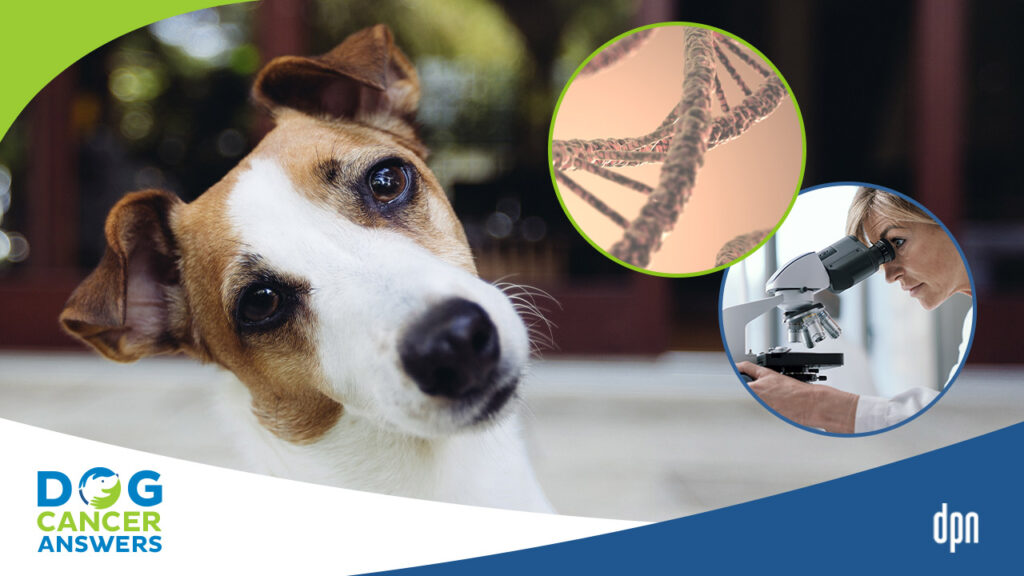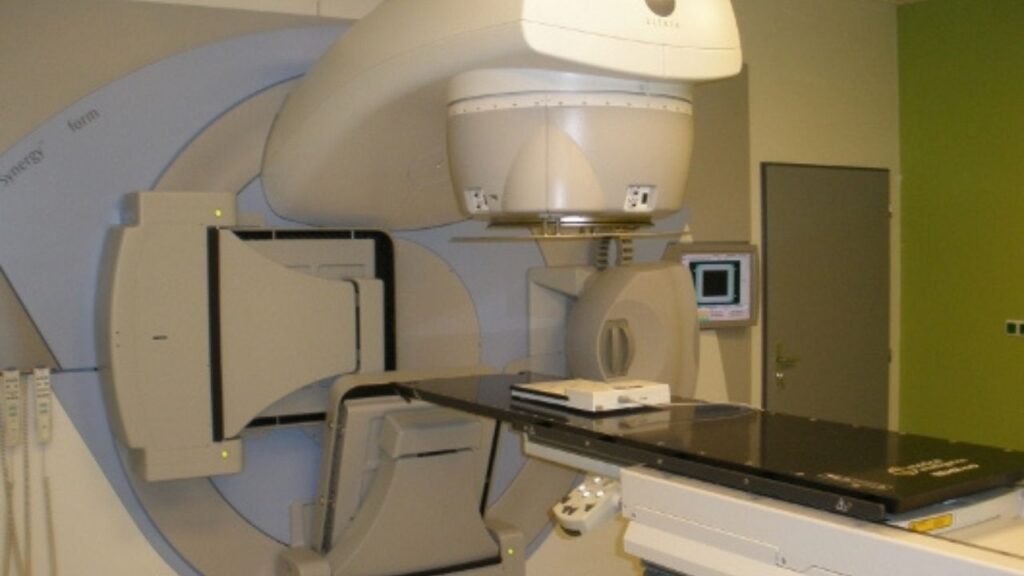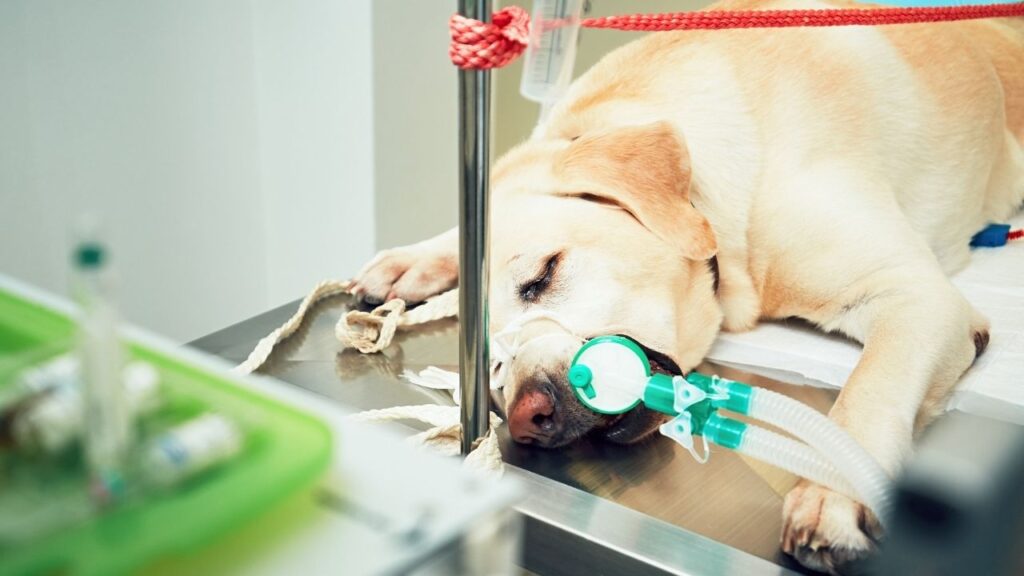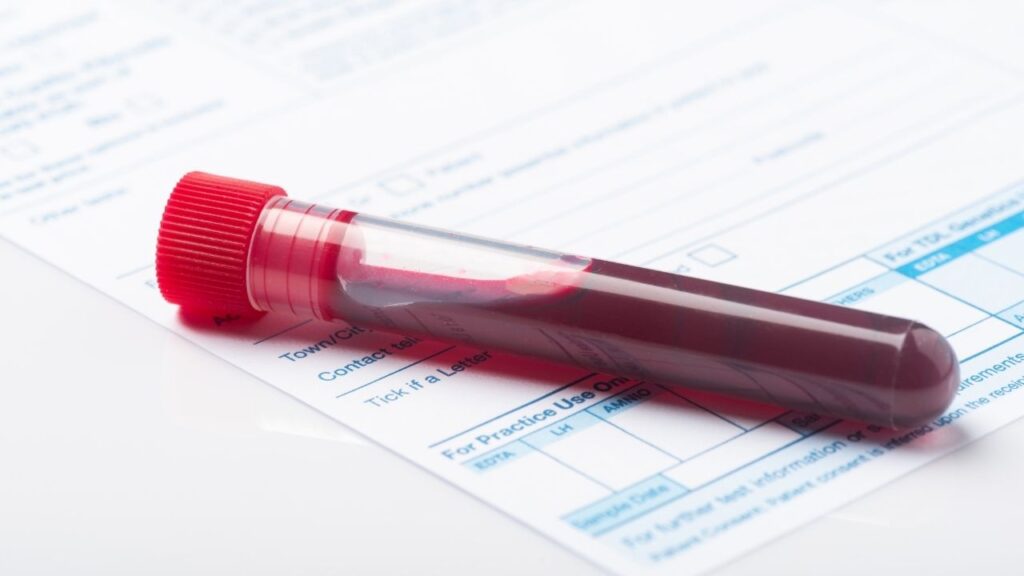Tumor genotyping examines your dog’s tumor to discover important molecular targets for effective and individualized cancer treatment. Already used in human oncology, it might well be “the future” of diagnosing and treating dog cancer.
Key Takeaways
- Don’t confuse genomic tumor testing, which examines the DNA of a tumor, with genetic testing for early detection, which may be possible in a reliable way very soon.
- There are many tests that confirm cancer in dogs, but genomic testing is a relatively new method that can help craft precision treatments targeted at that specific tumor.
- Veterinarians test for tumors in dogs using fine needle aspirates, biopsies, bloodwork, and imaging. Genomic testing of tumors gives even more specific information.
- A relatively new type of test called liquid biopsy is available from OncoK9. Costing about $400, it may in the future prove to be helpful in early detection as well as getting some DNA information about tumors from a simple blood draw.
- The reliability of genetic tests and genomic tumor typing is not yet fully known, but the more we use these tests, the more we find out for future generations of dogs.
How to Know What Kind of Tumor Your Dog Has
Knowing what type of cancer your dog has is a big step towards figuring out how to treat it. Getting an accurate diagnosis is essential. There are many tests veterinarians use to determine tumor type, but genomic tumor testing for dogs is relatively new. It may be “the future” of dog cancer treatment because it will help personalize treatments to match your dog’s tumor.
Traditional Methods of Determining Tumor Type
There are several ways for your veterinary oncologist to gain more information about the tumor. For example, the tumor’s tissue can be examined under a microscope (histology) or stained to test for the presence of certain antibodies. These methods have been used for a long time to help inform your vet if the tumor is malignant and what kind of cancer is present.
Genomic Tumor Testing for Dogs
Genotyping is a newer method of finding out what “type” of tumor your dog has based on its DNA, not on what it looks like under a microscope. Let’s examine how this works.
Normal DNA creates healthy cells. Changes in DNA are the biological basis of cancer.1 Because of this, the genetics of your dog’s tumor play a big role in its characteristics, including its diagnosis, development, and response to treatment.
Tumor genotyping takes this diagnosis process a step further because it can confirm what kind of cancer is present as well as every characteristic about it. Genotyping can reveal the tumor’s “instruction manual” and give your veterinarian a leg up in determining how best to combat it.
Genotyping is the process of determining the DNA sequence, or genotype, at a particular location in an individual’s genome.5
Genotypes Are Linked to Traits
When genotypes from multiple different individuals have been obtained, scientists can link particular genotypes to observed traits.5
For example, “patients with malignant tumor X, who have genotype Y, typically don’t respond well to chemotherapy drug Z.”
The more we find out about different genotypes, the more we can use that information to form treatment plans.
Genetic Mutations May Be Associated with Certain Cancers
Genes associated with cancer can have several different kinds of mutations. Your dog can acquire these mutations from one or both of their parents (germline mutations) or throughout their lifetimes (somatic mutations).
Ultimately, knowledge of these mutations at the DNA sequence level help in determining what medications and treatment plans may work best for your dog because they can reveal how the tumor may behave.10

KRAS Gene Study
Tumor genotyping has been used in humans for quite some time, and has impacted the way we treat human cancer.
For example, a 2010 study investigating the KRAS gene found that mutations in the gene impacted its ability to make a protein called K-RAS. Ultimately, the type of mutation present impacted how well a particular chemotherapy drug worked.
K-RAS is a messenger protein that tells the cell’s nucleus (its “command center”) what is going on outside of the cell, including when it’s time for the cell to grow and divide. When mutated, the KRAS gene may not be able to make K-RAS proteins that function as intended, potentially causing unregulated cell growth.
The study’s research team examined 773 tumor tissue samples from patients with colorectal cancers and genotyped them for seven different kinds of KRAS gene mutations. This allowed them to then determine which chemotherapy drug would work best for the patient based on previous data linked to the KRAS gene genotype.8
The goal in genotyping is to tailor medical treatments to specific tumors. Knowing that a chemotherapy drug is less likely to help a tumor because of its genetics helps oncologist make better, earlier decisions.
In fact, genotyping has been so helpful to personalizing cancer treatment plans for humans that some hospitals now require it as part of standard patient care.9
From Humans to Dogs
You might think this has nothing to do with your dog, but that’s not exactly right. Many facets of cancer between dogs and humans are equivalent, so human studies on cancer genetics using personalized medicine can still be helpful.1,7
There isn’t as much data for dogs in comparison to humans, but canine genetic studies are starting to collate genome data (data of all the genetic information in a particular dog) for particular dog breeds and the variants (differences in DNA and genotypes) between them.2
Studies on specific types of canine cancers, such as lung cancer, are also helping to guide the world of canine personalized medicine.7
At present, dog tumor genotyping companies are available, but limited. There are multiple DNA genotyping techniques,6 but current commercial canine genotyping companies focus on targeting specific cancer-related genes, sequencing them to determine the order of nucleotides which comprise DNA, and then identifying the mutations that are connected to traits associated with how the cancer will behave.
It’s early days in canine cancer, but the more data that is collected at this stage, the more likely dogs in the future will get tailored medicine.
Should I Get My Dog’s Tumor Genotyped?
Genomic tumor testing for dogs is still relatively new, but nonetheless impacting the world of canine oncology care. The decision about whether to get your dog’s tumor genotyped is not clear cut now but considering this list of pros and cons may help you.
Pros of dog tumor genotyping:
- It provides some information necessary for curating a targeted treatment plan.
- Genotyping allows veterinary oncologists to focus on specific molecular targets, instead of prescribing a “catch-all” approach with the hope of reaching the right ones.4
- Genotyping gives your vet the inside-scoop of which type of treatment, and which drugs, may be best to try first.
- It can confirm a cancer diagnosis.
- Some tumor types look the same under a microscope but behave very differently. Tumor genotyping may be particularly helpful if a veterinary pathologist or oncologist cannot identify the tumor using more traditional methods like histology.11
- It can provide peace of mind.
- DNA data is powerful. Having these data for your dog and their treatment may allow you to rest easier knowing that you are using one of the most advanced technologies available to help your dog fight their cancer.11
- It helps advance research.
- Getting your dog’s tumor genotyped contributes to the current data pools available and can assist with the continued development of the technology and understanding of which genotypes are associated with which traits.
Cons of dog tumor genotyping:
- It can give incorrect results.
- Errors can occur in diagnostic laboratory settings. This can result in faulty conclusions that could be life-threatening in the world of oncology.12
- It comes from companies that lack regulatory oversight.
- There is a general lack of regulatory authority for high complexity molecular testing in dogs.1 Diagnostic labs for dogs are not held to the same standards and regulations as those used for humans. The methods used are often not fully disclosed and the bulk of information that is considered proprietary makes it difficult for outside sources to ensure research rigor and integrity.
- It has a high upfront cost.
- Dog tumor genotyping can be cost-prohibitive on the front end because owners have to pay for their veterinarian as well as the company doing the genotyping. Some pet insurance policies may cover diagnostic test costs.
Where to Get Tumor Genotyping
Your veterinarian probably won’t be equipped to perform genomic tumor testing for your dog’s cancer. Instead, they will work with a commercial company.
Your veterinarian will take a tumor tissue sample and send it to a diagnostic lab per their instructions. That lab will then genotype the sample, figure out a treatment plan, and communicate with your vet on how best to move forward. Your veterinarian will then coordinate with you as the owner on what their recommendations are.
Currently, commercial diagnostic labs that focus on dog tumor genotyping are limited, with two primary companies dominating the market.
Fidocure
FidoCure® aims to use genomic testing to find mutations that potentially cause cancer and to suggest therapies that will precisely attack your dog’s cancer cells: www.fidocure.com
Thousands of veterinarians across the United States are already a part of the FidoCure network. Once the tumor tissue sample is received, FidoCure sequences specific biomarkers in DNA associated with cancer and provides a report to your veterinarian within 2 to 3 weeks. If you choose to move forward with the targeted treatment plan after meeting with your vet, then oral medications will be shipped within 2 to 4 days.
Some patients can be fast-tracked in the case of mast cell tumors or transitional cell carcinoma, which do not necessarily require diagnostic testing and can be treated with two target therapies that can be received within 5 days.
Ben Lewis of FidoCure explains the ins and outs of his business and how FidoCure hopes to help create precision medicine treatments for dogs who use their genomic testing service in this episode of DOG CANCER ANSWERS.
Vidium SearchLight DNA
Vidium Animal Health® offers the SeachLight DNA™ kit, which identifies mutations in 120 relevant cancer genes: https://vidiumah.com/searchlight-dna/
Based upon the DNA mutations present, the SearchLight DNA test identifies effective drug therapies.
Your veterinarian aspirates or biopsies a tumor sample and sends it to their lab for analysis. The DNA is then extracted from the sample, sequenced, and put into a proprietary database called VidiumInsight™. Information resulting from this database can provide diagnostic, prognostic, and treatment guidance for the mutations identified.
Oral therapies that target the specific mutations in the dog’s tumor are then prescribed via a report provided to your veterinarian 9 to 12 days after the sample is received.
Dr. Esther Chon of Vidium Health talks about how their SearchLight DNA genomic panel helps veterinarians choose the course of treatment most likely to yield the best results in this episode of DOG CANCER ANSWERS.
How Much Does Genomic Tumor Testing Cost?
Veterinarians are charged a flat per-dog patient fee by the genotyping company and then add their own charges onto that amount.4
- For example, the 2022 SearchLight DNA kit was under $1,000 for veterinarians, but dog owners faced veterinary bills ranging from $1,000 to $2,000.3
- The initial consultation with genotyping experts at FidoCure is free,4 but costs incurred for dog tumor genotyping after that will vary based on what your veterinarian charges.
This is why the up-front cost of genomic tumor testing for dogs is considered a con, as it can be monetarily prohibitive for some owners.
However, it may help to think of this up-front cost as an investment. Keep in mind that one of the pros of dog tumor genotyping is that it can identify specific targets and the treatments that work best for them. This means less money spent on therapeutics.
As of 2022, targeted therapies from Vidium Animal Health® were estimated to be under $300 per month, which is considerably less than the cost of “catch all” chemotherapy treatments that may not even work depending on the genetics of your dog’s tumor.3
Emerging Option: Liquid Biopsy
Although the application of personalized medicine to the area of canine oncology is lacking, the world of molecular biotechnology is nonetheless rapidly advancing and provides great promise for the future of dog cancer treatment.
One example is the use of liquid biopsy testing, which is now visible on the horizon for dogs.1 This method would both diagnose cancer earlier and eliminate the need for invasive biopsies to obtain a tumor tissue sample for genotyping.
That’s because liquid biopsy is conducted via a simple blood draw, not an aspirate or a biopsy. The blood sample hopefully contains bits of tumor DNA.
As cells die (during processes called apoptosis and necrosis), the membranes of the cell and its nucleus are broken down and their contents are released into the body’s blood stream. This includes the DNA that was in that cell, which is now “cell free”, and called cfDNA.
The idea behind the liquid biopsy is that this cfDNA would be captured in blood plasma from a simple blood draw that your dog may receive as part of a regular veterinary checkup.
The hope is that the blood sample can be sent to a canine genotyping company and the cfDNA then extracted and sequenced.
A company called PetDx® is currently sequencing the genome of tumors using liquid biopsy (OncoK9), but they aren’t reporting the mutations they find. Right now, their goal is to detect and identify cancer early, so it can be treated with better success rates. They plan on someday being able to add on the next feature in genotyping: telling you what mutations the tumor has, so you can tailor treatment to the genotype. The test costs about $400.
This is an exciting development and demonstrates just how fast the advancements in canine cancer care really are moving.
Dr. Andi Flory of PetDX explains how the OncoK9 liquid biopsy is being used currently, and what they hope it will do in the future, on this episode of DOG CANCER ANSWERS.
- Chibuk, J., Flory, A., Kruglyak, K.M., Leibman, N., Nahama, A., Dharajiya, N., van den Boom, D., Jensen, T.J., Friedman, J.S., Shen, M.R., Clemente-Vicario, F., Chorny, I., Tynan, J.A., Lytle, K.M., Holtvoigt, L.E., Murtaza, M., Diaz Jr., L.A., Tsui, D.W.Y., Grosu, D.S. 2021. Horizons in veterinary precisions oncology: fundamentals of cancer genomics and applications of liquid biopsy for the detection, characterization, and management of cancer in dogs. Frontiers in Veterinary Science https://doi.org/10.3389/fvets.2021.664718.
- Davis, B.W., Ostrander, E.A. 2014. Domestic dogs and cancer research: a breed-based genomics approach. ILAR Journal 55:59-68. https://www.ncbi.nlm.nih.gov/pmc/articles/PMC4158346/.
- Dog Cancer Answers. 2022. SearchLight DNA can find your dog’s cancer genotype. Dr. Ester Chon. Podcast. https://dogcanceranswers.com/searchlight-dna-can-find-your-dogs-cancer-genotype-dr-esther-chon/. Accessed on November 7, 2022.
- FidoCure. 2022. https://www.fidocure.com/. Accessed on November 7, 2022.
- IDT. 2022. What is genotyping. Integrated DNA Technologies. https://www.idtdna.com/pages/applications/genotyping#:~:text=Overview,to%20specific%20traits%20or%20disease. Accessed on November 7, 2022.
- Illumina. 2022. Introduction to genotyping. Genotyping methods and solutions. https://www.illumina.com/techniques/popular-applications/genotyping.html. Accessed November 7, 2022 .
- Lorch, G., Sivaprakasam, K., Zismann, V., Perdigones, N., Contente-Cuomo, T., Nazareno, A., Facista, S., Wong, S., Drenner, K., Liang, W.S., Amann, J.M., Sinicropi-Yao, S.L., Koenig, M.H., La Perle, K., Whitsett, T.G., Murtaza, M., Trent, J.M., Carbone, D.P., Hendricks, W.P.D. 2019. Identification of recurrent activating HER2 mutations in primary canine pulmonary adenocarcinoma. Clinical Cancer Research 25:5866-5877. https://aacrjournals.org/clincancerres/article/25/19/5866/332363/Identification-of-Recurrent-Activating-HER2.
- Myrvang, H. 2010. Tumor genotyping to predict response. Nature Reviews Clinical Oncology 7:551. https://www.nature.com/articles/nrclinonc.2010.144.
- Netterwald, J. 2009. Hospital to genotype all tumors. Nature Biotechnology 27:208. https://www.nature.com/articles/nbt0509-408b.
- ThermoFisher. 2022. Cancer genotyping assays: somatic & germline. ThermoFisher Scientific. https://www.thermofisher.com/us/en/home/life-science/cancer-research/cancer-genomics/cancer-genotyping-assays.html#:~:text=Cancer%20genotyping%20can%20be%20used,%2C%20and%2For%20DNA%20methylation. Accessed on November 7, 2022.
- Vidium. 2022. Vidium Animal Health. https://vidiumah.com/searchlight-dna/. Accessed on November 7, 2022.
- Whittaker, J. 2015. Tumor genotyping – how accurate are you? The Pathologist. https://thepathologist.com/inside-the-lab/tumor-genotyping-how-accurate-are-you. Accessed on November 8, 2022.
FidoCure® is a trademark of OneHealthCompany, Inc.
Vidium Animal Health®, VidiumInsight™, and SeachLight DNA™ are trademarks of The Translational Genomics Research Institute
PetDx® is a trademark of PETDX, Inc.
Topics
Did You Find This Helpful? Share It with Your Pack!
Use the buttons to share what you learned on social media, download a PDF, print this out, or email it to your veterinarian.






